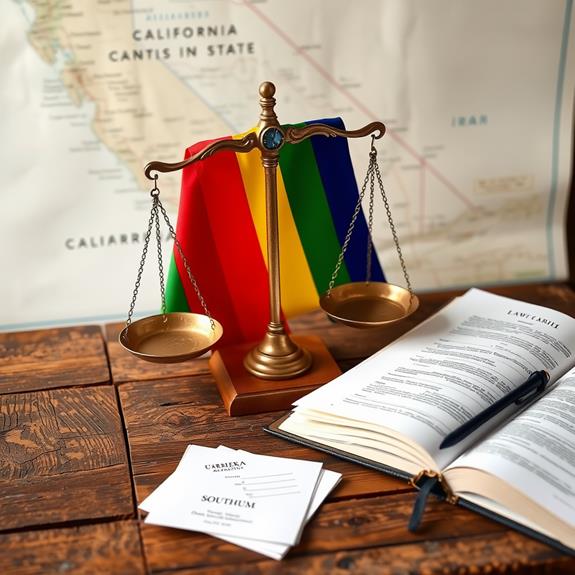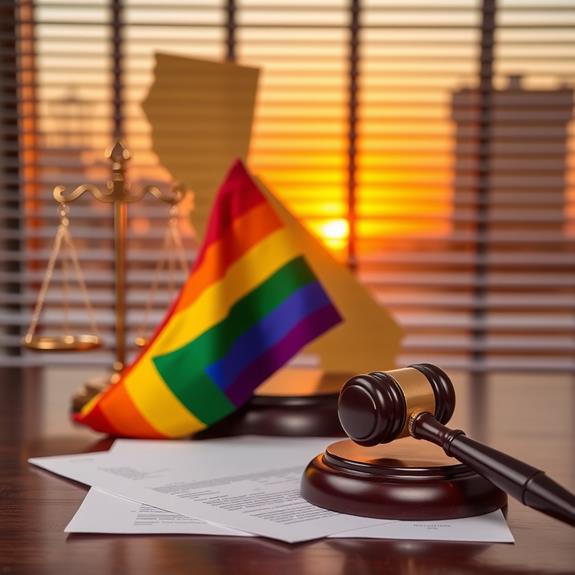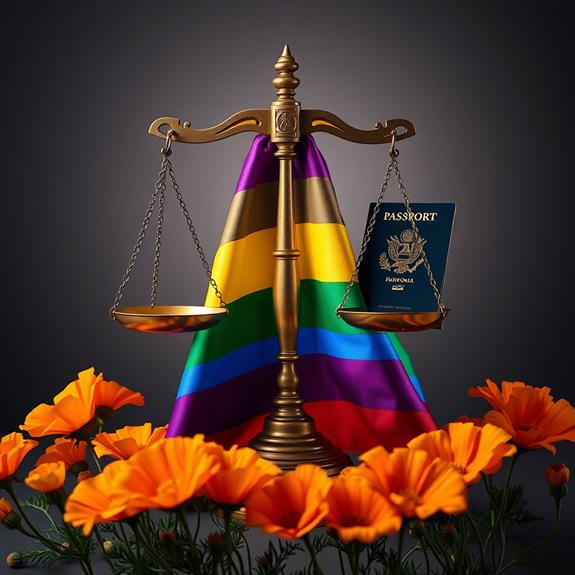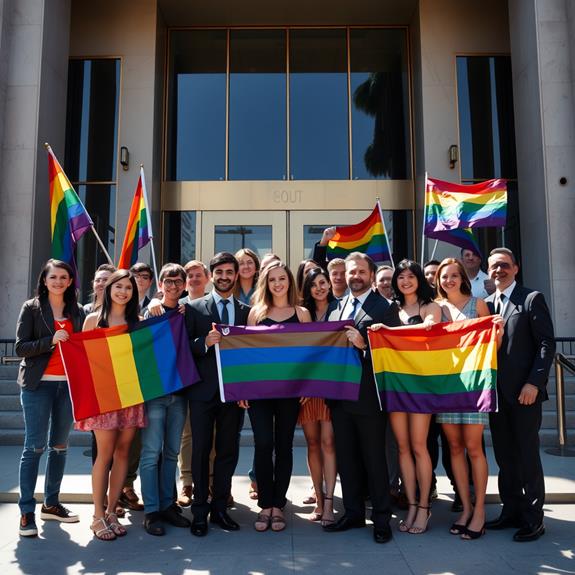If you're seeking LGBTQ asylum legal support in Southern California, you'll find several resources available. Key organizations include the LGBT Center in Los Angeles and the San Diego LGBT Community Center, which offer free legal consultations and immigration services. You can access pro bono legal representation through Immigration Equality and the National Immigrant Justice Center. It's essential to gather evidence, document your personal story, and research conditions in your home country. Collaborating with an experienced immigration attorney can help you navigate the complex application process and overcome legal challenges. The region's strong LGBTQ support networks can provide additional assistance as you build your case.
Understanding LGBTQ Asylum Eligibility

LGBTQ asylum seekers face unique challenges when applying for protection in foreign countries. To be eligible for asylum, you must prove that you have a well-founded fear of persecution in your home country due to your sexual orientation or gender identity. This persecution can take many forms, including cultural persecution and fear of violence.
To qualify for asylum, you need to show that your government is either unable or unwilling to protect you from harm. You must also demonstrate that relocating within your home country wouldn't solve the problem. It's important to provide evidence of your LGBTQ identity and the specific threats you've faced or would face if returned.
Key factors in LGBTQ asylum cases include:
- Laws criminalizing LGBTQ identities or behaviors in your home country
- Documented cases of violence or discrimination against LGBTQ individuals
- Personal experiences of threats, harassment, or abuse
- Inability to live openly without fear of harm
- Lack of protection from authorities
Understanding these eligibility criteria is essential for building a strong asylum case. It's often helpful to work with an experienced immigration attorney who specializes in LGBTQ asylum claims.
Application Process for LGBTQ Asylum
Once you understand your eligibility for asylum, it's time to start the application process. You'll need to file Form I-589, Application for Asylum and for Withholding of Removal, within one year of arriving in the United States. This form requires detailed information about your background, reasons for seeking asylum, and the conditions in your home country.
After submitting your application, you'll be scheduled for an asylum interview. During this interview, you'll discuss your experiences and the persecution you've faced or fear due to your LGBTQ identity. It's essential to provide specific examples and documentation to support your claim. You should also be prepared to discuss the current country conditions for LGBTQ individuals in your home country.
The interview process can be emotionally challenging, so it's advisable to seek support from LGBTQ-friendly organizations or legal professionals. They can help you prepare for the interview and guarantee you present your case effectively. Remember, the asylum officer will assess the credibility of your statements, so it's important to be honest and consistent throughout the process.
Legal Challenges in LGBTQ Cases

Asylum seekers from the LGBTQ community face unique legal challenges when presenting their cases. They must prove that they have a well-founded fear of persecution based on their sexual orientation or gender identity. This can be difficult, as many countries don't have explicit laws against LGBTQ individuals. Instead, you'll need to demonstrate a pattern of discrimination experiences or cultural persecution.
You'll have to provide evidence of your LGBTQ identity, which can be challenging if you've been forced to hide it in your home country. Personal testimonies, witness statements, and documentation of threats or attacks are essential. You may also need to explain why internal relocation within your country isn't possible.
Another hurdle is overcoming stereotypes about how LGBTQ people should look or act. Judges may have preconceived notions that don't align with your personal expression. It's important to work with an attorney who understands these nuances and can help present your case effectively.
Lastly, you'll need to show that your government is unable or unwilling to protect you from persecution. This requires thorough research and documentation of your country's laws and societal attitudes towards LGBTQ individuals.
Southern California LGBTQ Asylum Resources
Southern California offers a wealth of resources for LGBTQ asylum seekers maneuvering the complex legal landscape. You'll find numerous community organizations and support networks dedicated to helping individuals like you navigate the asylum process. These groups provide essential services, including legal advice, mental health support, and practical assistance.
Key resources include the LGBT Center in Los Angeles, which offers free legal consultations and referrals. The San Diego LGBT Community Center also provides immigration services and support groups. You can access pro bono legal representation through organizations like Immigration Equality and the National Immigrant Justice Center.
Support networks play an important role in your journey. You'll find LGBTQ-specific support groups that offer peer counseling and community connections. These networks can help you build a sense of belonging and provide emotional support during the challenging asylum process.
Remember to research local LGBTQ-friendly healthcare providers and housing resources. Many organizations offer assistance with finding safe accommodations and accessing necessary medical care. By tapping into these Southern California resources, you'll be better equipped to handle the complexities of seeking asylum as an LGBTQ individual.
Building a Strong LGBTQ Asylum Case

In light of the complex asylum process, building a strong LGBTQ asylum case is vital for success. You'll need to focus on evidence gathering and presenting a compelling narrative of your experiences. Start by documenting your personal story, including specific instances of persecution or fear of persecution based on your sexual orientation or gender identity.
Collect all relevant documents, such as police reports, medical records, or threatening messages. These pieces of evidence support your claim and demonstrate the risks you face in your home country. Witness testimonies from family members, friends, or LGBTQ organizations can also strengthen your case.
It's essential to research and provide information about the conditions for LGBTQ individuals in your country of origin. This might include laws, cultural attitudes, and documented cases of discrimination or violence. Be prepared to explain why internal relocation within your home country isn't a viable option.
Work closely with an experienced immigration attorney who specializes in LGBTQ asylum cases. They can guide you through the process, help you organize your evidence, and prepare you for interviews with asylum officers.

